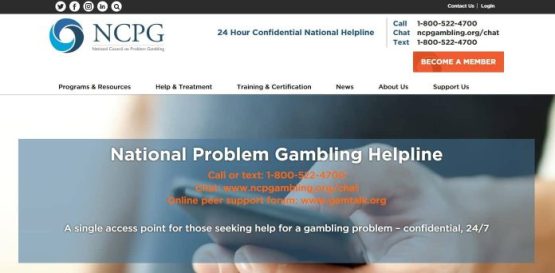For many, gambling is no more than innocent fun but, for some, it can quickly spiral out of control and become a serious problem. Because of this, it’s crucial to practice responsible gambling and know when to stop.
In this article, we’ll examine the dangers of gambling, offer tips for playing responsibly and provide resources available to help those struggling with a gambling problem.
What are the Dangers Associated with Gambling?
Gambling can be a fun and exciting form of entertainment, but it can also become a dangerous addiction with serious consequences. Sometimes, gambling can spiral out of control and bring about numerous difficulties in someone’s personal life. It has the potential to harm careers, negatively affect relationships with loved ones, and wreak havoc on finances. Let’s take a closer look at the main dangers of gambling below.
By practicing responsible gambling habits and setting limits, you can reduce the risks associated with gambling. Seeking help and support from friends, family, or professional resources can also be incredibly helpful in avoiding the negative social and mental health consequences of gambling.
Financial Consequences
Without setting and sticking to a budget, it can be all too easy to spend more than you can afford in pursuit of a big win. It’s not uncommon for problem gamblers to take out loans and end up in debt. This is a vicious cycle, as the pressure to recoup losses often leads to further gambling, which only exacerbates the problem.
Borrowing money from loved ones or taking out loans also adds to financial stress and can negatively affect personal relationships. Practicing responsible gambling, including setting and adhering to a budget, is crucial to avoid these devastating outcomes.
Responsible Gaming Explained
Responsible gambling refers to a set of practices and behaviors that aim to minimize the negative impact of gambling on individuals and society. It involves making informed decisions about how much time and money is spent on gambling, understanding the risks involved, and setting limits to ensure that gambling remains a source of entertainment and not a source of harm.
Responsible gambling also involves recognizing and addressing any potential signs of problem gambling, such as spending more money and time on gambling than intended, or experiencing negative consequences as a result of gambling.
To support responsible gaming, gaming operators offer various tools for players to manage their time and spending. This includes setting limits on daily, weekly, and monthly spending, the option to self-exclude, and restrictions on credit card usage.
Understanding The Different Types of Gamblers
It’s important to understand that different individuals may have different relationships with gambling, and recognizing which type of gambler you are can help determine if there is a potential issue. By being mindful of your own behavior and taking advantage of the resources available, you can engage in gambling in a safe and responsible manner.
Social Gamblers
Social gamblers are individuals who engage in gambling activities as part of a social group. They may gamble together with friends or family members and often gamble for the social aspect rather than for financial gain.
An example of this would be a group of friends who get together to play poker or go to the casino. They may not gamble with large sums of money and may not have a deep understanding of the games they are playing, but they participate in gambling activities as a form of socializing and entertainment.
Professional Gamblers
Professional gamblers make a living through gambling activities. They have a high level of skill and knowledge in a particular area of gambling, such as poker or sports betting. They may also have a strict discipline and strategy in their gambling practices.
Problem Gamblers
Problem gamblers are individuals who have a compulsive gambling habit that is causing harm to their personal and professional life. They may experience difficulty controlling their gambling urges, which can lead to financial problems, relationship issues, and other negative consequences. It’s worth noting that a problem gambler may present themselves as a social or professional gambler, and may even believe themselves to be one.
Pathological Gamblers
Pathological gamblers are individuals who suffer from a severe gambling addiction. They have an irrational drive to gamble despite the negative consequences they experience, and they may engage in destructive behaviors such as lying, cheating, and stealing to support their addiction.
Expert Tips to Help You Enjoy Responsible Gaming
Whether you prefer the thrill of roulette, the strategy of poker, the allure of slots, or the rush of sports betting, there are many ways to keep your gambling habits in check. Whatever your preference, you can follow these tips to gamble responsibly.
Set a Strict Budget Beforehand
Gambling can be a highly engaging and stimulating activity, so it’s common for players to get caught up in the excitement and end up overspending. A simple way to prevent this is to establish a budget before you start playing. This way, you have a clear understanding of how much you can afford to spend.
If you find that you’ve reached your budgeted amount, it’s crucial to have the discipline to stop, regardless of how long you’ve been playing or how invested you are in the game. By setting a budget and sticking to it, you can avoid overspending and maintain responsible gambling habits.
Know the Problem Gambling Warning Signs
Gambling issues can be difficult to identify, as the negative impacts often go beyond financial losses. It can affect self-esteem, relationships, physical and mental health, work, and social life. If you’re unsure if your gambling habits are problematic, look out for the following signs:
- Excessive spending
- Excessive time on gambling
- Hiding or lying about gambling
- Difficulty managing or stopping gambling
If you recognize any of these warning signs, it’s important to take action or seek help and support. The National Gambling Helpline offers free, confidential advice 24/7 at 0808 8020 133 or through live chat. Don’t wait to address these issues, as they can escalate and become worse.
Have Realistic Expectations
Realistic expectations are the foundation of responsible gaming. Since most gambling activities are based on luck, it’s important to accept that losses are a probable outcome. By viewing gambling as a form of entertainment rather than a way to make money, you should find it easy to enjoy gambling while playing within your means.
Use Self Exclusion if Necessary
If you believe your gambling habits, whether it be on slots, sports betting, or any other form, are spiraling out of control, it may be time to consider self-exclusion. Self-exclusion is a proactive step you can take to limit your gambling activity.
It works by requesting that a gambling provider ban you from gambling with them for a specified period of time. This can range from six months to twelve months, or even up to five years in some cases. By taking advantage of self-exclusion, you can regain control of your gambling habits and give yourself time to focus on different activities.
Set Limits
Many online casinos and sports betting websites offer the option to set limits, demonstrating their commitment to responsible gambling. By setting limits, you can prevent overspending and become more aware of your behavior.
It encourages self-reflection, bankroll management, and responsible gambling. While setting limits is not a guarantee against problem gambling, it is a valuable tool for maintaining control and avoiding excessive spending.
The Best Resources for Gambling Problems
If you or someone close to you is showing signs of gambling addiction, it’s crucial to take action immediately and seek help from dedicated organizations. Gambling addiction can have severe consequences, including financial problems, strained relationships, and a negative impact on mental health. Fortunately, help is readily available for those in need. Here are some organizations that offer support and resources for problem gamblers.
Gamblers Anonymous
- Website: gamblersanonymous.org
- Phone Number: (909) 931-9056
- Fax: (909) 931-9059
Gamblers Anonymous (GA) is a community of individuals who have come together to overcome their common struggle with gambling addiction. Members offer support and encouragement to one another, sharing their experiences to find solutions and help others recover.
To become a member, the only requirement is a sincere desire to stop gambling. The organization is self-sustaining and does not charge any dues or fees. The ultimate goal of GA is to help individuals break free from the grip of gambling addiction and assist others in doing the same.
National Council on Problem Gaming
- Website: ncpgambling.org
- Phone Number: 1-800-522-4700
- Chat: ncpgambling.org/chat
The National Council on Problem Gambling (NCPG) is at the forefront of efforts to reduce the harm caused by gambling. The organization’s vision is to improve health and wellness by reducing the negative impacts of problem gambling on individuals and society.
The organization leads the way in collaborating with state and national stakeholders to develop effective policies and programs to support individuals affected by problem gambling. NCPG remains neutral on the issue of legalized gambling, instead dedicating its efforts solely to advocating for those impacted by problem gambling.
Gambling Therapy
- Website: gamblingtherapy.org
- Email Address: [email protected]
Gambling Therapy is an excellent resource for anyone struggling with problem gambling. The online platform offers a range of services, including practical advice, emotional support, and access to trained professionals and experienced peer support workers.
The website and mobile app provide information and resources, as well as a live support helpline and text-based support groups. Additionally, a 24/7 peer support forum provides a space for individuals to connect and discuss their experiences. All services are provided free of charge, making Gambling Therapy a valuable resource for anyone looking for support in overcoming a gambling problem.









